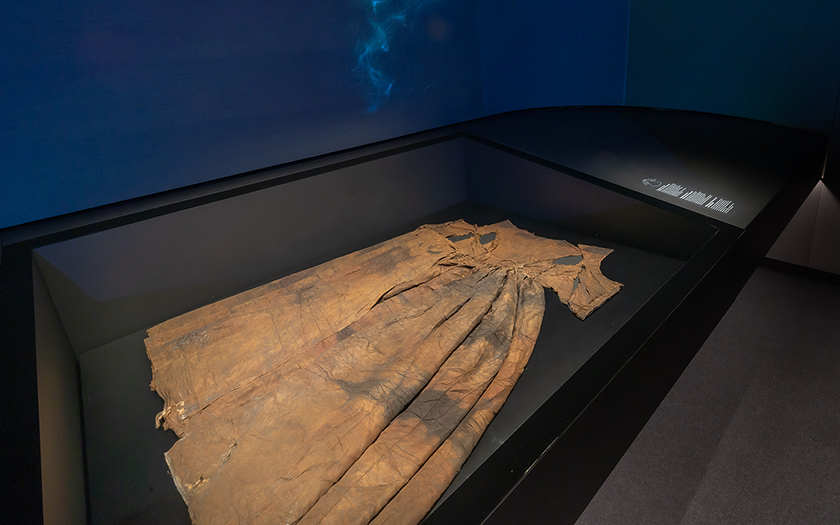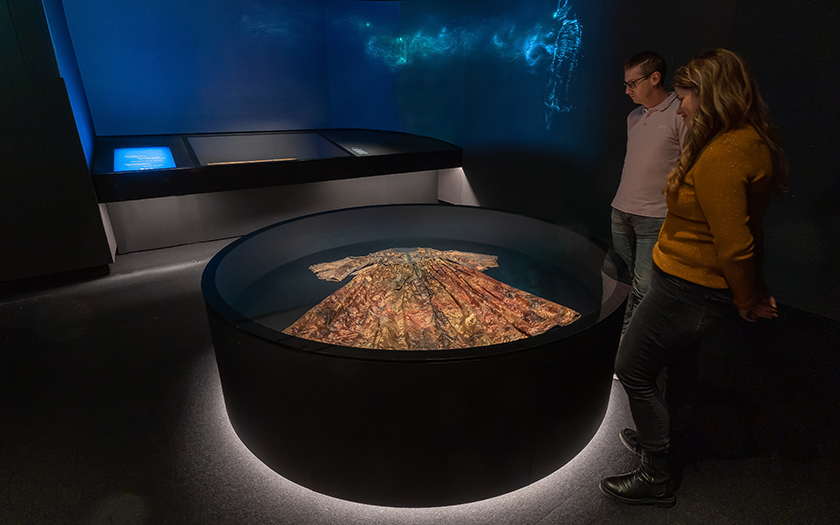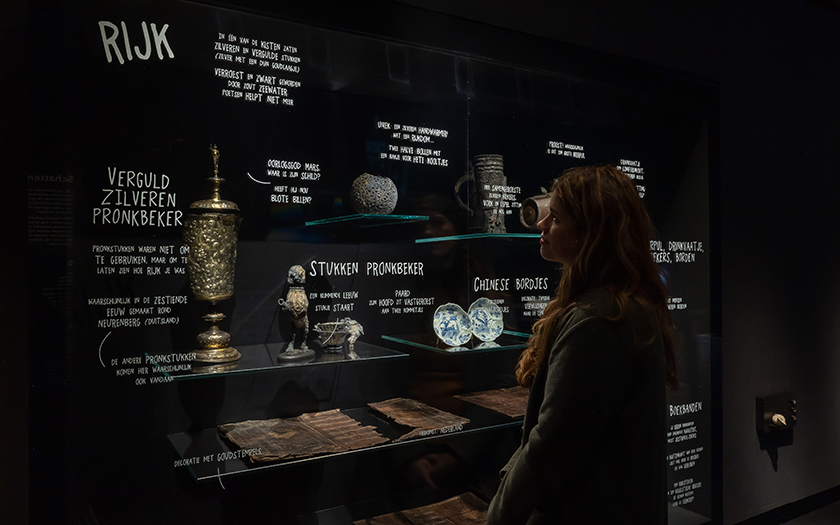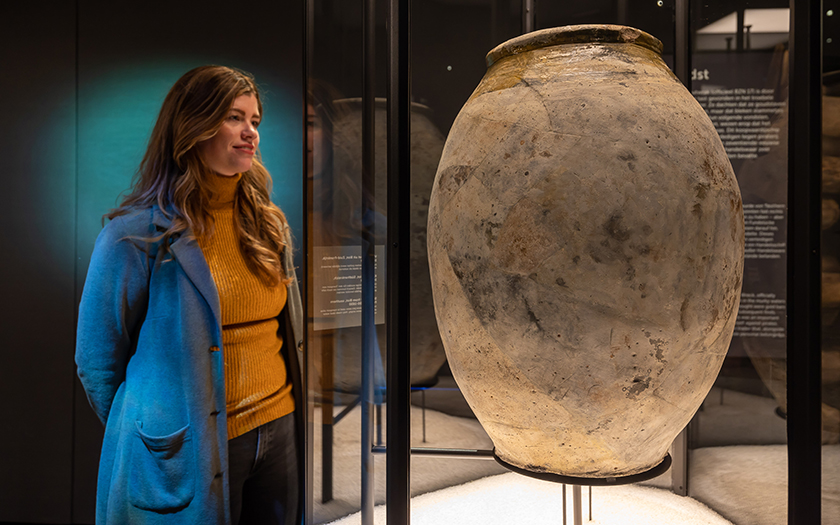“This is one of the most unique historical finds ever”
 Museum Kaap Skil has once again unveiled an extraordinary new find from the world-famous Palmwood Wreck: the ‘Silver Dress’, a 17th century dress with interwoven pieces of silver. Recent research suggests that it was most probably a wedding dress. It is the second dress to be discovered from the 17th century shipwreck. The almost completely intact silk dress from the Palmwood Wreck previously made international news. Both dresses are on display from the 13th of November in the new exhibition, together with a selection of the most exclusive artefacts found in the wreck. The findings belong to the province of North-Holland and have been granted to the museum on long-term loan.
Museum Kaap Skil has once again unveiled an extraordinary new find from the world-famous Palmwood Wreck: the ‘Silver Dress’, a 17th century dress with interwoven pieces of silver. Recent research suggests that it was most probably a wedding dress. It is the second dress to be discovered from the 17th century shipwreck. The almost completely intact silk dress from the Palmwood Wreck previously made international news. Both dresses are on display from the 13th of November in the new exhibition, together with a selection of the most exclusive artefacts found in the wreck. The findings belong to the province of North-Holland and have been granted to the museum on long-term loan.
Wedding dress
 The salvaged 17th century wedding dress consists of separate parts, in contrast with the other dress from the Palmwood Wreck. The body of this expensive silk garment, the bodice and the skirt, are still attached. Originally, the dress was most probably made of lightly coloured silk. The current, brownish colour is the effect of almost four centuries on the seabed. The whole surface of the dress is decorated with silver adornments. These consist of small pieces of silver, which have been woven into the fabric in the shape of love hearts in a repetitive pattern of knotted hearts. A fitting design for a wedding dress in those days.
The salvaged 17th century wedding dress consists of separate parts, in contrast with the other dress from the Palmwood Wreck. The body of this expensive silk garment, the bodice and the skirt, are still attached. Originally, the dress was most probably made of lightly coloured silk. The current, brownish colour is the effect of almost four centuries on the seabed. The whole surface of the dress is decorated with silver adornments. These consist of small pieces of silver, which have been woven into the fabric in the shape of love hearts in a repetitive pattern of knotted hearts. A fitting design for a wedding dress in those days.
“Thanks to the silver, the dress would have had a formal, light and sparkling appearance. It must have been one of the most extraordinary dresses that a lady from the highest social classes in Western Europe would have worn in her life. The dress was suitable for special occasions such as engagement parties, coronations and marriages. Silver fades and deteriorates relatively fast in salty environments but the traces and patterns of the original decorations are still visible. The style and origin of this wedding dress are very similar to the other dress from the Palmwood Wreck but the two dresses are not the same size,” according to conservator Alec Ewing.
Maarten van Bommel, Professor of Conservation Science in the conservation and restoration of movable cultural heritage at the University of Amsterdam and involved as research leader in the exhibition: “It is unbelievable what we have discovered here, this is one of the most unique historical finds ever. There may only be two such dresses in the whole world. And they are both here, on Texel.”
 Corina Hordijk, artistic director of Stichting Texels Museum of which Museum Kaap Skil is a part, is euphoric: “It’s fantastic that we can add this wedding dress to the already-so-impressive collection. All unique details of the dress have come to light, it’s really beautiful. Research has been conducted into the collection for years, more than 50 international experts have been involved.”
Corina Hordijk, artistic director of Stichting Texels Museum of which Museum Kaap Skil is a part, is euphoric: “It’s fantastic that we can add this wedding dress to the already-so-impressive collection. All unique details of the dress have come to light, it’s really beautiful. Research has been conducted into the collection for years, more than 50 international experts have been involved.”
Unique oxygen-free display cases
The finds are now back at Museum Kaap Skil on Texel, after six years elsewhere. According to Rosan Kocken, deputy of culture and heritage: “The collection is a great addition to the cultural heritage already on display in North-Holland. This was the reason that the province has invested in the realization of this important exhibition. This made the special installation at Museum Kaap Skil possible and meant that unique oxygen-free display cases could be developed for the fragile textiles. I’m really proud that the extraordinary finds are now finally on display for everyone.”
Corina Hordijk: “The textiles are very sensitive to light and oxygen. This means that the display cases have to meet very strict requirements. These display cases, which have been assessed by the University of Amsterdam in collaboration with the Cultural Heritage Agency of the Netherlands, ensure that the textiles can be displayed without them deteriorating. There are only a few oxygen-free display cases in the world and then not in these dimensions or quantities. It is innovative heritage management and we expect that the knowledge we’ve gained here will also be interesting for other parties.”
 Palmwood Wreck
Palmwood Wreck
The Palmwood Wreck was discovered by Texel divers in 2014. This wreck of a 17th century merchant ship contained, amongst other artefacts, a number of chests with an extremely valuable and personal collection: best silverware, clothing and remnants of a library. The almost completely intact silk dress found in the wreck became international news in 2016.
Other finds
Alongside the dresses, 32 book-bindings were also found. In most cases, these were large leather book-bindings, covered with diverse decorations. One of the most remarkable was a calf leather book-binding with a royal stamp: the Scottish-English royal family Stuart’s coat of arms. Despite this find, there is no reason to assume that there was a link between the dress and the British monarchy.
Amongst the textile finds from the Palmwood Wreck were also a number of objects which would have belonged on a dressing table of a very affluent lady in the beginning of the 17th century. These include a case containing a comb, a silk-covered brush and a piece of fabric which may have been part of a pincushion. The most unusual part found was a beautiful table mirror with two doors, covered with richly decorated silk velvet.
Thanks to…
The Palmwood Wreck exhibition forms a whole with the enormous scale-model of the Texel Roads and the new exhibition World Voyage, about global trade in the 17th and 18th century and the central role which Texel played in it. The exhibition has been made possible by the province of North-Holland, Vriendenloterij, Stichting Toeristisch Investeringsfonds Texel (STIFT), Waddenfonds and the Friends of Museum Kaap Skil.


